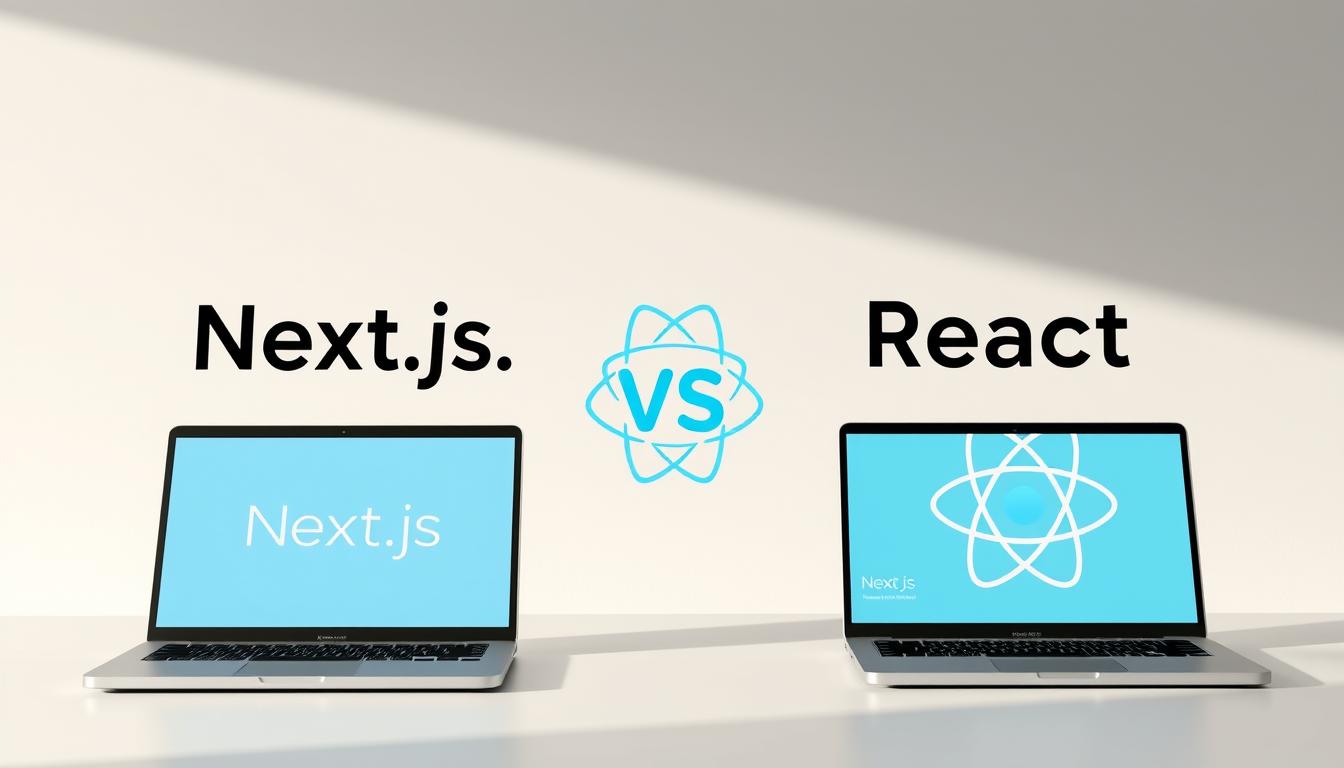Selecting the right tool for your web app is important. It begins by learning Nextjs or React: which library you should pick? Both are based on JavaScript but offer different advantages. This guide will assist you to select the best one for your particular project, by comparing some of their basic features.
Key Takeaways
- Next.js adds server-side rendering to React’s core.
- React is about building reusable components for complex UIs.
- Search Engine Optimization benefits also vary on the choice of framework.
- Overall development flows differ in the two tools.
The learning curve is based on how comfortable your team is with these systems.
Introduction to JavaScript Modern Frameworks
Now days, you can build web apps a lot more easy with tools such as React and Nextjs. These frameworks enable developers to create apps that run well on all devices. They save time, and help ensure apps work right everywhere.
The Importance of Web Application Frameworks
IDEs can save you some serious time because these tools learn exactly what coding in frameworks is like. They provide solutions to common problems:
- They pitch in by providing the pre-fabricated parts for your app.
- It makes apps that run faster with smarter code.
- They also make apps look consistent on all devices
The Development of the Front-End
Front-end development has evolved a bit. It was frameworks that were largely responsible for this shift:
| Era | Key Advancements | Frameworks |
| 2000s | Basic interactivity | jQuery |
| 2010s | Component-based architecture | Angular, Backbone.js |
| 2020s | Server-side rendering, hybrid setups | React, Nextjs, Vue.js |
Now, the emphasis with frameworks like React and Nextjs is how to make apps fast and scalable. They respond to user expectations of fast and dynamic web apps.
Understanding Nextjs: Key Advantages
Nextjs framework comes with utilities to facilitate development. It is the approach of server-side rendering (SSR) so that web pages load more quickly. You don’t have to use another libraries for this in React.
Nextjs framework also does automatic code splitting. This reduces initial load times and can improve performance.
Here’s how Nextjs framework stands out:
- Static Site Generations: Pre-generate content for near-instantaneous delivery.
- File based Routing : Structure Your pages with Folder not like React library manual route structural configuration.
- API routes: Run your api handlers in the same codebase, without involving separate server setups.
| Feature | Next.js | React |
| Default Rendering | SSR or static export | Client-side by default |
| Performance Optimization | Automatic image optimization | Requires plugins like Next. js |
| Deployment | Framework-optimized builds | Needs configuration |
Nextjs is ideal for large apps that need room to scale. The tools do have the effect of saving developers time. React, however, requires a lot more setup. Ready to decide? Well, let’s cut to the chase in the next tab.
Deep Dive into Nextjs Features
Next.js is more than just a framework. It’s a toolkit that makes complex tasks easier. Let’s see how its special features help with next.js seo benefits over react and make developers more efficient.
SEO Benefits Over React
Search Engines Love Speedier, More Crawlable Sites. Nextjs generates static site maps and server-side (SSR) page rendering. This allows the content to be instantly available to bots. Unlike React, Nextjs does the SEO of its own.
This translates to faster indexing, and better ranking for your site.
- Dynamic Rendering: Present pre-rendered pages to search bots, while allowing client-side interactivity for users.
- Static Export Deploy fully static websites for the best possible performance and SEO.
File-Based Routing and SSR
No more complex setup files. To create routes you just pitch some files on the /pages folder. Pages load immediately with SSR, even a dynamic page.
This gives access to content to both users and search engines quicker. It also minimizes your bounce rates.
Including API Routes and Optimization
No additional backend set up is required. Nextjs allows you to create API endpoints under the /pages/api directory. These are routes concerned with retrieving data and caching, and help to minimize external dependencies.
The framework also takes care of image optimization and lazy-loads assets. This helps to keep your site fast and search engine friendly.
React in Focus: Key Features
React does so well due to its approach and tools to eases coding. Discover what makes React an ideal tool for dynamic interfaces.
Component-Based Architecture
Central to React is its component-based architecture. It enables you to separate apps into reusable chunks. Imagine a button component that knows how to handle clicks and looks awesome in every corner of your app, without extra code. It is a way to avoid repetition of code and it is easy to find the bugs.
Broad Ecosystem/Community
React’s universe is rich in developer tools. Libraries like React Router manage navigation and React Testing Library makes testing easy. There’s always a lot of help on Stack Overflow and Discord, and the official guides are always current. As one developer said,
“Here is where React’s community support makes problems turn into cakewalks.”
State Management Solutions
Choose the best state management for your project:
| Library | Use Case | Key Features |
| Redux | Large-scale apps | Global state, predictable updates |
| Context API | Simple apps | Native to React, easy setup |
| MobX | Real-time apps | Reactive state tracking |
React-sized: React scales to fit your project, large or small.
Nextjs vs React? Which Framework to Choose?
When choosing between Next.js and React, consider what the biggest thing for your project is. Think about how quickly your site has to load and the talent of your team.
Performance and Speed Considerations
| Aspect | Next.js | React |
| Default Speed | Automated SSR/SSG for near instant first loads | Needs manual config for server-side rendering |
| Optimization Effort | Predefined image and code optimization tools | Requires external libraries for similar speed ups |
| Best For | High-traffic sites needing instant page loads | Prototypes or flexible-focused apps |
Learning Curve and User Community
Next.js is based on React, and you definitely need to be familiar with React. React has a huge community and so does Next. js, and it provides a more gentle learning curve once you have the basics down.
- Learning curve: Next is just built on top of React’s core concepts.
- Community: React’s community has 3x more open source packages than Next.js-specific tools
- Documentation: Next. are strongly coupled with React best practices
“Next.js handles performance “under the hood,” while React lets you control every detail at the cost of setup time.”
Here, ask yourself this: Do you value performance now over control over your setup? Which one you choose depends on what you need.
Use Case and Best Practice Comparison
Choosing between Next. js and React are depending on your project requirements. So, it’s about time we look at use cases where each one of these rising stars really sits well with.
Next.js works best for:
- SEO-important sites such as blogs or ecommerce sites
- Static sites that need to be displayed as quickly as possible
- Projects that require SSR out of the box
React excels for:
- Apps What’s this : A simple app with extravagant UI interactions
- Using third-party libraries during prototyping
- Legacy Codebases Migrating to New Frameworks
Adopt these best practices:
- For Next.js: Use file-based routing to streamline page management
- For React: Pair with Redux for complex state handling
- Test for performance in the early days of your journey MagicMock.defer(). side_effect = AttributeError(‘fake’). always_test_performance.toHaveBeenCalled() Hooray!
Ask yourself: do I want out of the box things like SSR. Next.js delivers. Value flexibility to personalize every detail? React adapts better. Align your framework with the key objectives of your project.
Which One Is Best for Beginners Nextjs or React?
Are you new to Web Development and wondering whether you should go for Next.js and React? Both are awesome for learning modern web skills, but they teach in different ways. Which is best for beginners Next.js or React, depending on what you aspire to do, to the way you prefer to learn programming.
“Next.js wraps React’s core, it is a great way to make harnessing its full power much easier while providing a good base for a first project.”
Ease of Training for Newcomers
Next.js has built-in React (server-side rendering, and routing out of the box)
Setting up server side rendering and integrating features like hydration and state management can be a bit tricky in React, since it essentially needs a manual implementation.
Both use JS/TS but Next. js abstracts away the complexities involved in the deployment process.”
Access to Tutorials and Resources
React has been around for many years and there are plenty of great and free guides and courses. Services like Codecademy and Udemy even have react tutorials for beginners that cover the basics. Next.js offers official starter kits but has fewer resources. YouTube channels such as Traversy Media as well as freeCodeCamp educate both frameworks effectively so it’s easy to learn.
Think about what you want: Next.js will give you a full-stack start out of the box. React allows you to learn the fundamentals first, then get bigger. Either way, you’ll add skills that come in handy in what the cool kids call modern web development.
Future Trends and Innovations
Web development is always changing, and Next.js and React are no exception. Let’s explore what’s on the horizon for these tools
Next.js, would also going even deeper into server components, which would further improve data fetching. React will continue improving the developer experience of declarative UIs through better hooks and state management. Both are intended to make it easier to perform tasks like real-time updates and added AI integration.
- Serverless frameworks will bloom, allowing you to ship faster with fewer lines of code.
- It becomes normal to use TypeScript, leading to less error in the larger project.
- Performance tools like Next.js Image Optimization and React Suspense will improve workflows.
Watch for React’s concurrent mode and Next.js’s edge runtime features. These updates will make apps load faster, and work on new devices such as AR/VR. Keep an eye on both the official blogs and community forums to pick up on threads early. Choose between Next. js and React based on where you think technology is going.
Conclusion
Choosing between Next.js vs React, it all depends on your project’s objectives. Next. js works well for speedy and SEO-friendly loading pages. It works great for static or hybrid sites.
React is better for complex, dynamic apps. It allows for deep customization. This makes it ideal for projects that need a lot of flexibility.
Consider your team’s skill set. Next. They’re both easy to set up, likely good for smaller teams or startups. React requires more configuration but there’s a massive treasure trove of tools.
Both are very well supported. This guarantees that you will receive dependable support and new resources.
Next.js is quicker and easier to deploy, which is a huge plus. But React is more flexible with third-party libraries. Consider your future needs.
If you’re focused on SEO or static content, then Next.js is a good choice. You’ll want to go with React for flexibility. Your choice will determine the success of your project.
Both Next.js and React as a preferred Web Dev stack. Choose one that matches the skills of your team and the goals of your project. Your decision here could make or break your project.
FAQ
What are SEO benefits of Nextjs over React?
Next.js support server side rendering (SSR) and static site generation (SSG). This is good for your website’s SEO. Profit React has client-side rendering instead. Next.js is more search engine friendly.
How do Next.js features compare to React features?
Next.js has automatic code splitting and file-based routing. It also has API routes. React focuses on components and has a wide ecosystem. Both frameworks cater to different needs.
Which framework is better for beginners: Nextjs or React?
React is easier for beginners, there are a lot of learning resources. Next.js is great for people who want instant performance and SEO.
What does Next.js or React do to improve website speed?
Next.js is faster because of its server-side rendering. This means quicker load times. React might need extra work to match Next.js’s speed.
How is community support for Nextjs?
Yes, Nextjs has a big community. There’s lots of documentation, tutorials, and resources. It’s easy for developers to get help.
What are the ideal projects for Nextjs?
Next.js is ideal for performance and SEO. It’s great for blogs, e-commerce sites, and marketing sites. It’s also good for apps with dynamic content.
Want to dive deeper?
Important JavaScript Concepts You Need to Know as a Beginner
Advanced JavaScript Concepts You Should Know
Keep watching for more dev tips, tutorials, and comparisons!




Leave a Reply